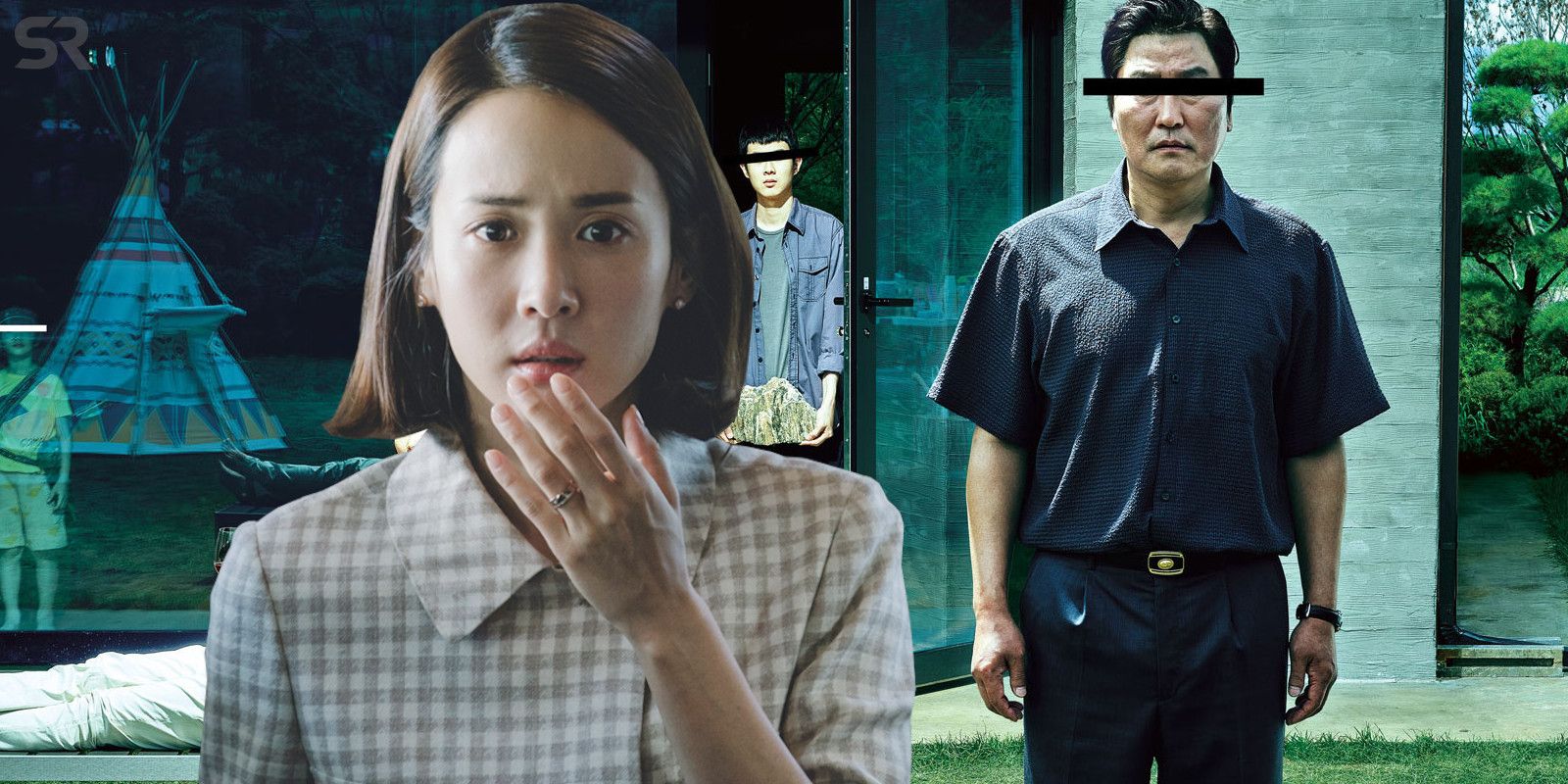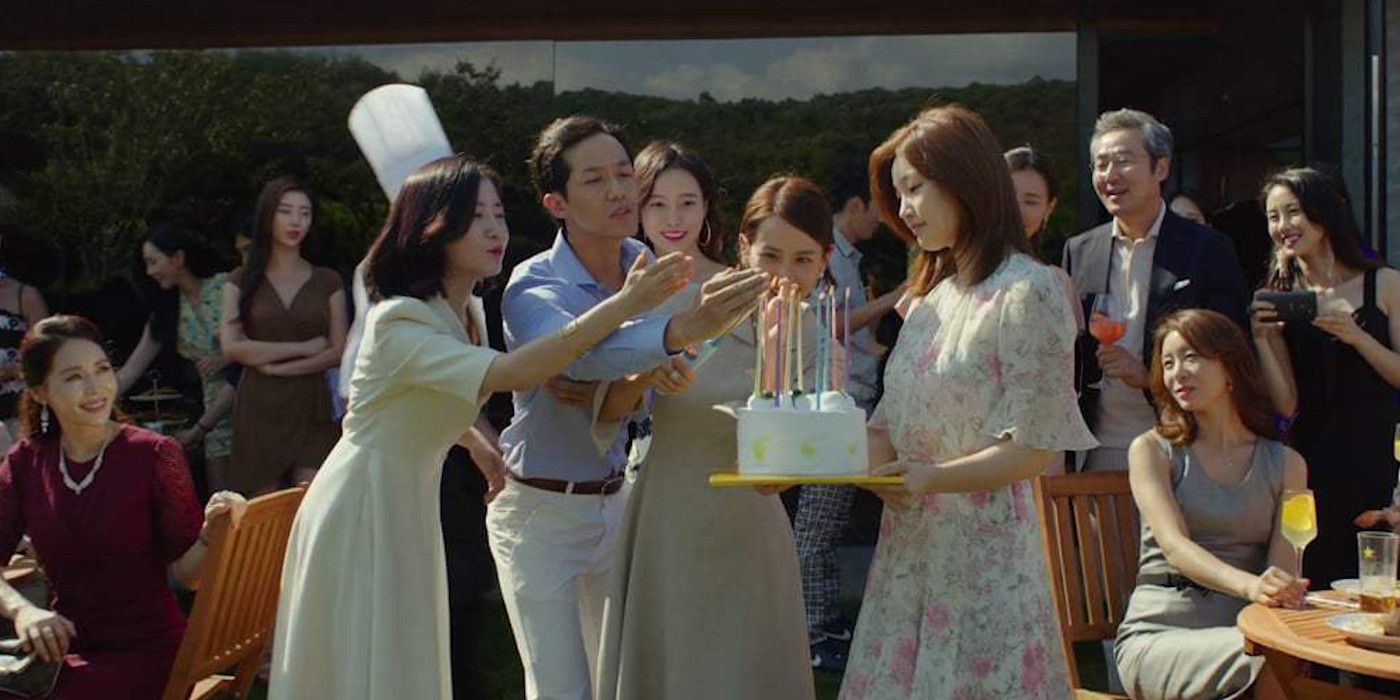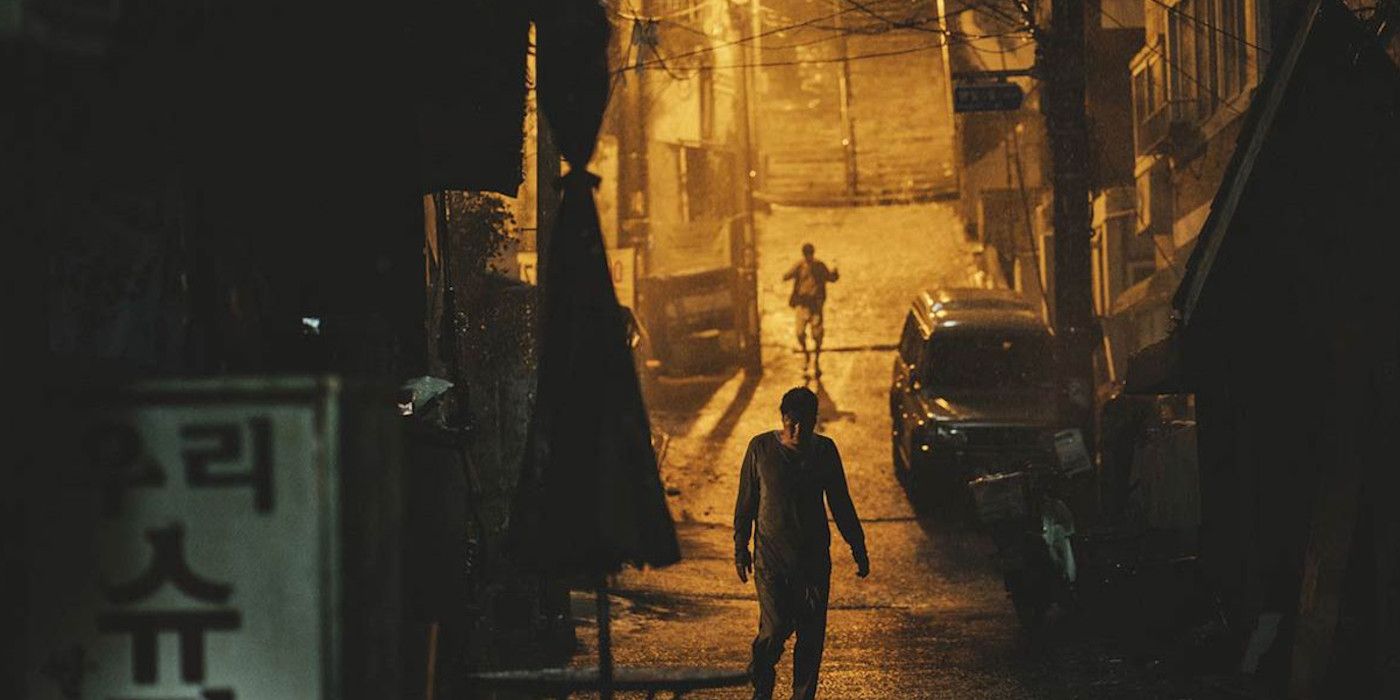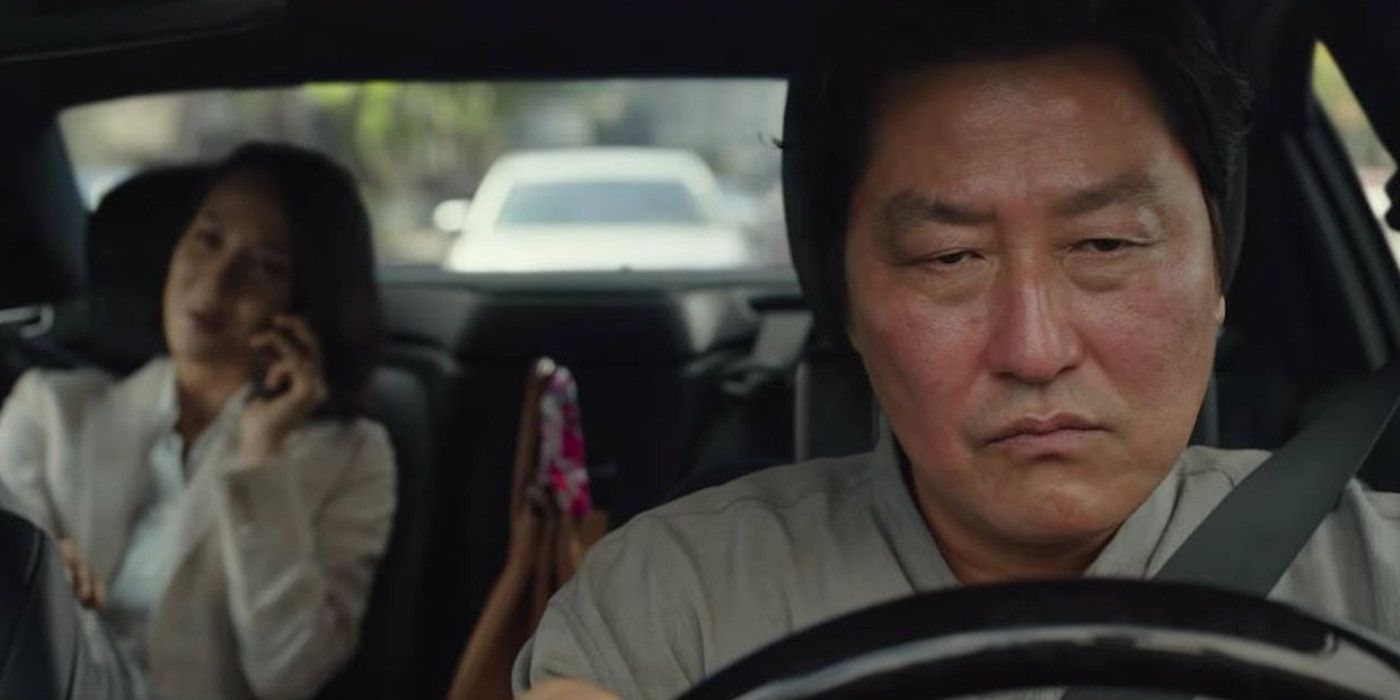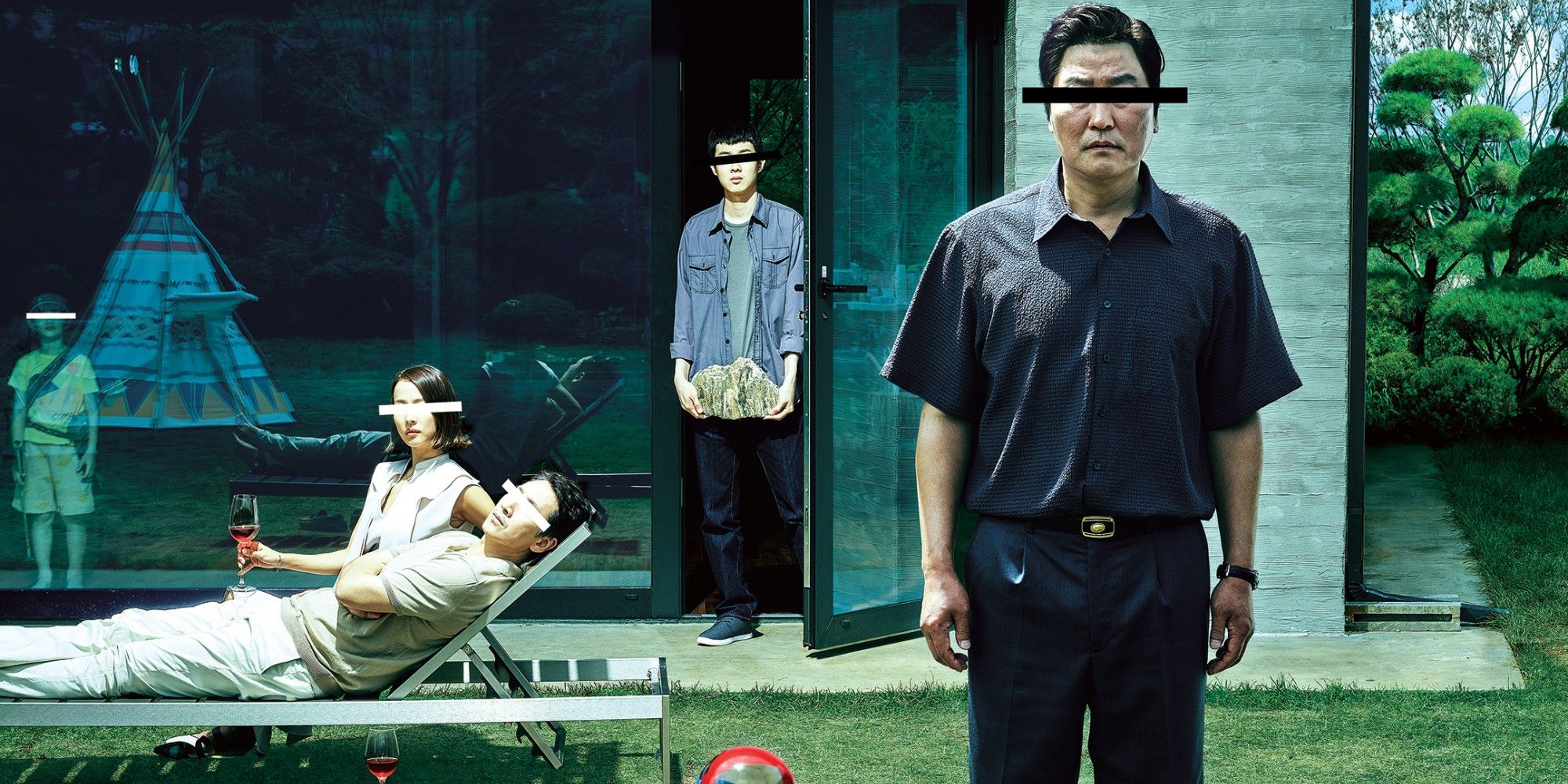Parasite, Bong Joon-ho's thrilling, socially significant dark comedy, starts out as a swashbuckling and humorous romp of the poor outsmarting the rich, but takes a sudden and violent dive off the deep end in its terrifying finale — what exactly does this ending mean, and what's in store for the Kim family? Bong Joon-ho's followup to his 2017 climate change adventure film Okja, the movie stars the director's regular collaborator Kang-ho Song and has been a frontrunner in the Oscars race since its release last November. The critical reception is due, in part, to how Parasite comes to a close, and what its repercussions mean for its swindling Kim family.
Life, at the beginning of Parasite, does not come easy for the Kim family. Tucked away in their small semi-basement apartment, they make ends meet by tucking in the corners of pizza boxes as freelance hands for hire. All that changes when the family's son Ki-woo (Train to Busan's Woo-sik Choi) is given the opportunity to replace his friend as the English tutor to the daughter of a very wealthy — and gullible — family, the Parks. With his remarkably quick wit, it does not take long for Ki-woo to smuggle his parents and his sister into other positions around the household.
Through this storm of treachery and deception, Bong Joon-ho is able to craft a dark and resilient tale of class struggles like no other. Ignited by a sudden and wicked twist of fate, these important socioeconomic factors come clashing together during the film's final stretch.
What Happens in Parasite's Ending
After getting rid of the home's previous housekeeper through immoral means, the Kims' mother Chung-sook is brought on as a replacement and becomes the final member of the family to con their way into employment at the Park residence during an economic drought. Parasite ensures, however, that they do not get to enjoy their good fortune for long. When the Parks go out on a camping trip, the Kims swarm the empty mansion to party in style. Their night takes a frantic turn, however, once the former maid, Moon-gwang, returns, claiming that she had been ushered out of the house so quickly that she had left something behind: her husband, Geun-sae, who has been hiding in a bomb shelter beneath the house for years.
Upon figuring out the truth about Moon-gwang, the Kims accidentally expose themselves as con artists and a ferocious fight breaks out between the two families. Eventually, the Kims overpower the married couple, fatally injuring Moon-gwang and locking her husband back in the basement. The victorious Kims race out of the house and all the way back down to their semi-basement, which has incidentally been flooded by a ferocious storm. Displaced and sent to the local gymnasium for shelter, the Kims are brutally awakened by invitations to an impromptu Park party, which they are bullied into attending.
When they get there, however, the previous night's events catch up to them. While the storm appears to have cleared the way for a fun birthday bash, what the Parks do not know is that lurking beneath their basement is a rage they can't possibly fathom. It is also one that Kim Ki-woo attempts to diffuse himself, bringing the "metaphorical" rock that's brought his family good fortune down to Geun-sae as a gesture of peace. However, the husband, who had become a widower over the night, has no interest in this peace offering, striking Ki-woo with the rock twice.
Dripping in blood, Geun-sae storms up the stairs. Grabbing a knife from the kitchen's block, he ventures outside and enacts his revenge, stabbing Kim Ki-woo's sister, Kim Ki-jeung, and causing the Parks' youngest son to have a seizure. In doing so, he also breaks the last of Ki-taek's patience. On top of the fact that Mr. Park seems totally indifferent to the life-threatening injuries his daughter has sustained, Mr. Park's unconscious comparison of Ki-taek to the dying maniac, Geun-sae, causes him to snap, killing his employer, and fleeing the scene.
Storm For The Poor, Party For The Rich
As the Kims scurry out of the Park household following their interrupted night of partying, Bong Joon-ho depicts the entirety of their long trek homeward. Watching the family sprint further and further down, taking the same trails as the rainfall, the social divide between them and the rich becomes painstakingly clear, as does the hopelessness in attempting to go the other way. While the notion of "economic inequality" suggests that there is a way to bring balance to the socioeconomic scale, Parasite is much more pessimistic. As soon as the Kims are able to fully infiltrate the Park household, finally finding some semblance of prosperity and wealth, the Moon-gwang situation – and the storm – comes and wipes them all the way back down to the bottom.
To make matters worse, the city's impoverished neighborhood, geographically located beneath the prosperous neighborhoods, is literally flooded with the city's sewage. It isn't unfair to assume that the majority of this waste was produced from families such as the Parks, and yet, it is the Kims and everyone in the lower sanctions of the economic spectrum who are met with the reckoning. The Kim family's home is destroyed, and the con artists who were less than an hour before getting drunk and peacefully observing the storm from the safety of a mansion, are now neck-deep in the vilest materials imaginable.
The building class tension and the duality between the two families finally begin to take hold in the Park home as the party preparations are underway. For instance, Ki-taek (Song) is not only repulsed by Mrs. Park's indifference towards the lives that were affected by the previous night's rainstorm and disaster, but also by the direct condescension she exhibits when she rolls the car window down in disgust — a direct reference to when Ki-taek overheard Mr. and Mrs. Park gossip and poke fun at his smell, saying that it's the same kind of smell of those who take the subway. The guests at the party are similarly indifferent to the previous night's events and for the first time in the film, the thieving and conniving Kims are more isolated in their pain than ever before.
Who Is The Parasite(s)?
The film's title, Parasite, is as much an exhibit of class warfare as anything depicted in the film. And beyond the Kims, who are seen throughout the movie directly infiltrating and leeching off the riches of the Parks, by the time the movie comes to its gruesome conclusion, it becomes clear that there are actually several other parasites in the movie as well.
The other working-class parasites in the film are represented in Moon-gwang and Geun-sae. They themselves have been feeding off of the Parks for years, yet they display a great deal of resentment and anger towards the Kims, a group of people with which they have a whole lot in common. That being said, the feeling is mutual with the Kims. In displaying their violent clashes together, Bong Joon-ho illustrates the unfortunate fact that too often marginalized people attack each other, wholly ignoring the problems they share.
But perhaps the greatest parasites in the film are, in fact, the Parks. While they may not take anything of monetary value from anyone, the lifestyle they have afforded themselves is one that is built on the labor and sweat of working-class people. The dark comedy Parasite suggests that their spot at the top of the socio-economic chain allows them to completely ignore and isolate themselves from the rest of society and the work they provide them, a position they are more than happy to be in.
Ki-woo's Fantasy
Parasite offers a taste of what will happen to the Kims following its climatic, terrible and horrific day. After Ki-woo wakes up from his month-long coma and brain surgery, he is immediately placed under arrest and sent to trial with his mother, though both miraculously walk out of court with nothing more than probation. With Ki-jung killed and Ki-taek nowhere to be found, the son and mother try to harvest a normal life together once again.
It's a task that proves to be more difficult than meets the eye. Following his brain surgery, it is suggested that Ki-woo isn't at top functionality. He is unable to manifest appropriate mental reactions or emotions to the events that surround him and now, on top of the scandal he and his family had just partaken in, it is unlikely that he'll ever get to go to school. So, instead, he spends much of his time hiding up in the mountains above the Parks old house, looking down in remembrance of the time he and the Kims once spent together at the top of society. It is on one of these nightly outings that Ki-woo discovers that his father managed to scurry beneath the house after Mr. Park's murder and into the bunker, where he now lives in regret and guilt.
Knowing that his son was once a boy scout, he, like Geun-sae before him, sends morse code messages using the bunker's light switch. Upon this discovery, Ki-woo vows to finally go to school, earn a degree, get a high-paying job and, once the house inevitably goes up for sale again, purchase the Park's cavernous home and reunite what's left of his family.
The Real Meaning of Parasite's Ending
As was already mentioned, Parasite is one of the more pessimistic of Bong Joon-ho's politically sensitive and important films. It depicts the current economic model as one that is wholly unforgiving, truly relentless, and nearly impossible to penetrate. If interpreted literally, Ki-woo's plan is nothing more than a daydream, as the final shot takes the form of him finishing his letter in the semi-basement.
But if Parasite teaches its audience anything, it's that anything can go from great to terrible in a flash, especially dreams. Ki-woo's ideas and promises for his future sound promising on the page, but would more than likely crumble into nothing once he tries to put it into practice. The film has already established the great lengths to which people go to climb society's economic tower. While it isn't given much of a chance to explore the crippling effects the brain surgery has taken on Ki-woo's intelligence, Parasite does suggest that Ki-woo's injuries have greatly affected him. So, starting from the bottom and making it to the top with a slight criminal record and a brain injury is next to impossible. And it isn't likely that his father could live long enough to see that happen.

